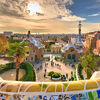14 Nights | Transatlantic
You will visit the following 6 places:

Seville
Seville is the artistic, cultural, and financial capital of southern Spain. It is the capital of the autonomous community of Andalusia and of the province of Seville. It is situated on the plain of the River Guadalquivir, with an average elevation of 7 metres (23 ft) above sea level. The inhabitants of the city are known as sevillanos (feminine form: sevillanas) or hispalenses, following the Roman name of the city, Hispalis. The tapas scene is one of the main cultural attractions of the city: people go from one bar to another, enjoying small dishes called tapas (literally "lids" or "covers" in Spanish, referring to their probable origin as snacks served on small plates used to cover drinks). Local specialities include fried and grilled seafood (including squid, choco (cuttlefish), swordfish, marinated dogfish, and ortiguillas), grilled and stewed meat, spinach with chickpeas, Jamón ibérico, lamb kidneys in sherry sauce, snails, caldo de puchero, and gazpacho. A sandwich known as a serranito is the typical and popular version of fast food.

Tenerife
Tenerife is the largest and most populated island of the seven Canary Islands; it is also the most populated island of Spain. Tenerife is also the largest and most populous island of Macaronesia. About five million tourists visit Tenerife each year, the most of any of the Canary Islands. It is also one of the most important tourist destinations in Spain and the world. Tenerife hosts one of the world's largest carnivals and the Carnival of Santa Cruz de Tenerife is attempting to become a World Heritage Site. The island is home to the University of La Laguna, which was founded in 1792 and is the oldest university in the Canaries. San Cristóbal de La Laguna (a World Heritage Site) is the second city of the island and the third one of the archipelago. The city of La Laguna was also capital of the Canary Islands until Santa Cruz replaced it in 1833. In the Teide National Park (World Heritage Site), in the center of the island, is the highest elevation of Spain as well as the highest of the islands of the Atlantic Ocean, and the third largest volcano in the world from its base, Teide. Also located on the island Macizo de Anaga since 2015 is Biosphere Reserve and is the place that has the largest number of endemic species in Europe. The island's capital contains the architectural symbol of the Canary Islands, the modern Auditorio de Tenerife.

Barcelona
Barcelona – Spain's enchanting capital, second largest and most populous city. It is a huge city that vibrates with life, and there’s certainly not another city in the country to touch it for its sheer style, looks or energy. It is one of the world's leading tourist, economic, trade fair and cultural centers, and its influence in commerce, education, entertainment, media, fashion, science, and the arts all contribute to its status as one of the world's major global cities. Barcelona is home to masterpieces of many great architects – the most famous of which is Antoni Gaudí.

Fort Lauderdale
Fort Lauderdale is a city in the U.S. state of Florida, 28 miles (45 km) north of Miami. The city is a popular tourist destination, with an average year-round temperature of 75.5 °F (24.2 °C), and 3,000 hours of sunshine per year. Greater Fort Lauderdale which takes in all of Broward County hosted 12 million visitors in 2012, including 2.8 million international visitors. The district has 561 hotels and motels comprising nearly 35,000 rooms. Greater Fort Lauderdale has over 4,000 restaurants, 63 golf courses, 12 shopping malls, 16 museums, 132 nightclubs, 278 parkland campsites, and 100 marinas housing 45,000 resident yachts. Fort Lauderdale is named after a series of forts built by the United States during the Second Seminole War. The forts took their name from Major William Lauderdale (1782–1838), younger brother of Lieutenant Colonel James Lauderdale. William Lauderdale was the commander of the detachment of soldiers who built the first fort.

La Palma Island
La Palma, also San Miguel de La Palma, is the most north-westerly island of the Canary Islands,Spain. La Palma has an area of 706 km2 making it the fifth largest of the seven main Canary Islands. La Palma, like the other islands of the Canary Island archipelago, is also a volcanic ocean island. It is truly an idyllic spot with numerous ecological treasures.

Gran Canaria
Gran Canaria is the second most populous island of the Canary Islands, a Spanish archipelago. Located in the Atlantic Ocean,it was populated by the Canarii, who may have arrived as early as 500 BC. The Canarii called the island Tamarán or Land of the Brave. The third largest island in the Canary Islands, Gran Canaria has the largest population. It's often described as a "continent in miniature" because it has so much variety to offer. In the north, capital city Las Palmas is a major stop for cruise ships and duty-free shopping. The island’s interior is rural and mountainous.








